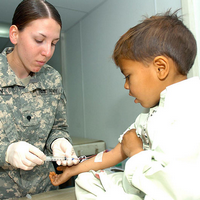Jeff McCausland, senior fellow at the Carnegie Council, wears many hats. As a retired Army colonel who’s on a first name basis with Gen. David Petraeus and Gen. Stanley McChrystal, he has an acutely military perspective on the war in Afghanistan. As an analyst, professor, and former dean of academics of the U.S. Army War College, he also sees the conflict through an academic lens. When McCausland spoke to a small group at the council’s headquarters in New York yesterday, he combined these two perspectives and outlined the unique challenges of this particular war. To surge or not to surge? […]
Afghanistan Archive
Free Newsletter
Jean-Dominique Merchet notes the latest example of civil law’s intrusion into warfare: The families of two of the French soldiers killed in an August 2008 ambush in Afghanistan are pursuing a civil lawsuit against the operation’s commanders for “deliberately endangering the life of another.” Now, two things worth noting here. The first is that the families are reacting in large part to the lack of any formal sanction of the unit’s officers, who even the army concedes committed “errors of evaluation” in the operation in question. The families also expressed dissatisfaction with the army’s account of the events that led […]
Dare I say it? A few shards of optimism coming out of Iran and Afghanistan? Yes, according to two videos we posted in our video section today. The first video, from Al-Jazeera, looks at a new Persian film, “No One Knows About Persian Cats,” which tells the tale of a young man and woman who try to form a band after being released from prison. Their efforts take us through the underground rock scene of Tehran where the city’s youth fight for their jams. Though the story is fictional, actors from the film (now in exile in the U.K, after […]
A new survey by the Asia Foundation shows that more people inAfghanistan feel the country is moving in the right directioncompared to the same poll last year. Those who felt that Afghanistanwas, in fact, worse for the wear, contributed the downfall to a lack ofsecurity and corruption. VOA News’ Meredith Buel reports on theresults.
A few weeks back, I considered running an experiment here on the blog, where for a certain period of time, I would actually defend positions that were the opposite of my own. The idea was to challenge my own assumptions by adopting the point of view of haduJ — the anti-Judah that exists in some alternate reversed-pole universe. I increasingly wish I could say that my endorsement of an Afghanistan troop surge, even with all the caveats I put on the idea, is part of that experiment. But I wouldn’t do that sort of thing without announcing it first, and […]

BAGRAM, Afghanistan — In March, ordnance exploded on a home in Kapisa province, in northeast Afghanistan. One child died. Another, 6-year-old Razia, was badly burned. When Aziz, her father, took her in his arms, Razia’s scalp came away in his hands. In early interviews, Aziz blamed the explosion on the U.S.-led coalition. U.S. Air Force officers said the ordnance might have been white phosphorous, a specialized incendiary that the Taliban is unlikely to possess. Later, Aziz claimed the Taliban had, in fact, fired rockets on his home. Regardless of who actually caused Razia’s injuries, it was the Americans that evacuated […]
As I mentioned to Hampton, only half-jokingly, it looks like I picked a bad week to come out in favor of an Afghanistan surge. Make that a really bad week. Seriously, I’m very conflicted about the way forward, and I think that comes through pretty clearly in this Bloggingheads segment I did with Michael Cohen. (The entire episode can be seen here.) We taped this early last week, before I’d read Tony Corn’s Small Wars Journal article (.pdf) that nudged my thinking past the tipping point. It’s easy to reduce my argument regarding the importance of political signaling to being […]

If you ask Spc. Daniel McBroom of the Army National Guard, the hardest part of war was the wind. “Physically and mentally, the wind was the worst,” he recalls. “This endless hot wind, like 100-degree fans turned toward your body.” But McBroom, 23, who returned in June after serving a year in Iraq, says that the toll of war will be different for everyone. “There’s no doubt it will mark you, change your body. But I don’t think anyone can predict what that change will be.” McBroom is one of nearly 1.5 million Americans enlisted in the U.S. armed forces, […]
Just to follow up on what I wrote yesterday, I realize that endorsing a time-bounded but significant troop increase represents something of a reversal, in that I’ve argued consistently for drawing down the U.S military footprint in Afghanistan. So I feel like I owe an explanation, even if some of my ambivalence has come through in my previous posts. Part of the reason for the shift is because, while I’m still very skeptical that we’ll be able to achieve even our minimal objectives in Afghanistan, I’m no longer convinced that they’re impossible. That comes from reading the arguments of a […]
NewsHour’s Margaret Warner interviews Rory Stewart, author, activist and former British diplomat who walked across Afghanistan as part of a larger trek across Asia. Stewart projects a time frame of 20 to 30 years before Afghanistan reaches levels of government functionality akin to that of neighboring Pakistan.
At a Brookings Institution event on Oct. 16, “The Afghanistan Debate: Assessing the President’s Policy Options,” Senior Fellow Bruce Riedel and Georgetown Visiting Professor Paul Pillar disagreed on the merit of military engagement in Afghanistan. Riedel says President Obama’s assessment of the volatile situation in the borderlands between Afghanistan and Pakistan is not only correct, but reason to continue military efforts in the region. Pillar’s approach to military presence in Afghanistan is much more cautionary. He says that regardless of stabilization, terrorism will continue to spread globally.
If you’re having trouble keeping the Afghanistan war debate straight, I can’t recommend highly enough Tony Corn’s article in Small Wars Journal (.pdf), titled, “Toward a Kilcullen-Biden Plan? Bounding Counterinsurgency in Afghanistan.” Corn essentially argues that the problem with Gen. Stanley McChrystal’s strategic review is that it pays lip service to the importance of the political dimension of counterinsurgency without truly following it through to its logical conclusions, and that the troop increase he requested is presented as an open-ended commitment. Instead, according to Corn, the troop increase should be bounded in time, put in the context of Vice President […]
